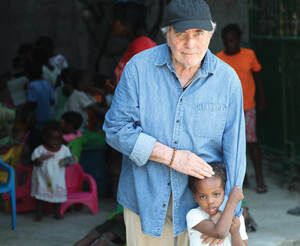
As violence engulfs Port-au-Prince, the kids Straub serves face desperate scarcity. ©2019 Santa Chiara Children’s Center
Haiti’s prime minister Ariel Henry agreed today (March 12) to resign. The BBC News headline indicated that Henry’s announcement, delivered via video address from his temporary exile in Puerto Rico, came “as law and order collapses” in the country Henry has struggled to govern as acting president for nearly three years.
But residents of Port-au-Prince, the capital of this Caribbean nation that until recently was reachable by a two-hour commercial flight from Miami, know that what once passed for law and order in their world collapsed long ago. Haiti has not held elections since 2016. Its last president, Jovenel Moïse, was assassinated in July 2021.
Since that date, and before gangs moved to put an end to Henry’s time in office nearly two weeks ago, thousands had already lost their lives to gang violence in Port-au-Prince — many gunned, macheted or burned to death, their bodies left in the streets.
“While this insurrection,” which began with shots fired at Haiti’s major airport on February 29, “drew the attention of the news media, things in the city have been a nightmare for more than two years,” said Gerry Straub, the American founder of the Santa Chiara Children’s Center orphanage in the city’s Delmas neighborhood, a safe haven for dozens of children.
In the March 7 audio message (below) asking Santa Chiara supporters for prayers, Straub reported that in the days since the armed gangs that control 80 percent of the city attacked Toussaint Louverture International Airport — effectively denying Henry’s return from a trip to coordinate a United States-backed peacekeeping mission — the small hospital in his neighborhood alone had treated 68 patients for gunshot wounds. No one is spared; the victims included 14 women and two children.
Subsequent attacks closed Louverture, its lone runway one mile from Santa Chiara’s front gate, suspending air travel to and from the country. Cargo ships cannot dock at Port-au-Prince’s gang-controlled port. The gangs have broken thousands of inmates out of two major prisons. Meanwhile, water, food and fuel supplies, already running short, are available only at the risk of one’s life as businesses and as many as 40 police stations have been destroyed in gang attacks.
Straub, 76, an author and documentarian whose travels while making some two dozen films on global poverty led him to Haiti more than 14 years ago, chronicled Port-au-Prince’s most recent descent into widespread, indiscriminate, chronic violence in our Winter 2022-23 issue. During that span, as he reminded followers in a second message (below) that he recorded on March 11, his life was threatened on three occasions, but, he said, “I always knew I could leave any time I wanted.”
Now, with the airport closed indefinitely and what remains of the Haitian government to be left in the care of a nine-member “transitional council,” things are different. “Like most Haitians, I am trapped, my freedom of movement stolen by a collection of flip-flop-wearing thugs who have no hesitation in killing a woman or a child, priest or nun, doctor or lawyer, in the most savage way possible,” he said, “I can’t go out the Santa Chiara gate without armed security.”
He added, “I’m not terribly worried about being killed or kidnapped by the gangs. I’m very worried about running out of water and food for the kids. And running out of diesel fuel for the generator that keeps the refrigerators and fans running at night.
“I am now not just living among the poor, I am one with the poor.”
Notre Dame’s Long History in Haiti
The Congregation of Holy Cross began missionary efforts in the country in 1944. Rev. Thomas Streit, CSC, founded the Notre Dame Haiti Program in the neighboring city of Leogane in 1997 with the mission to research and eradicate lymphatic filariasis, a disfiguring, mosquito-borne disease. In 2010, following an earthquake that killed more than 200,000 Haitians, a network of alumni health care providers organized by chemistry professor emeritus Emil T. Hofman offered months of lifesaving care to injured survivors. More recently, the Alliance for Catholic Education and Pulte Institute for Global Development launched Read Haiti, a four-year program to promote early-grade literacy in more than 1,000 schools around the country.
John Nagy is managing editor of this magazine.